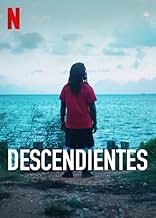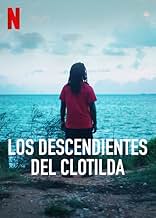IMDb-BEWERTUNG
7,1/10
1530
IHRE BEWERTUNG
Nachkommen versklavter Afrikaner*innen, die 1860 illegal auf einem Schiff in Alabama eintrafen, hoffen nach dem Fund des Wracks auf Gerechtigkeit und inneren Frieden.Nachkommen versklavter Afrikaner*innen, die 1860 illegal auf einem Schiff in Alabama eintrafen, hoffen nach dem Fund des Wracks auf Gerechtigkeit und inneren Frieden.Nachkommen versklavter Afrikaner*innen, die 1860 illegal auf einem Schiff in Alabama eintrafen, hoffen nach dem Fund des Wracks auf Gerechtigkeit und inneren Frieden.
- Regie
- Drehbuch
- Hauptbesetzung
- Auszeichnungen
- 7 Gewinne & 24 Nominierungen insgesamt
Empfohlene Bewertungen
I found this to be a fascinating documentary, that held my attention throughout.
That said, it left me with some unanswered questions, in part because of its format, which focused on interviews with people who lived in Africatown, near where the Clotilda, evidently the last slave ship to arrive in the United States, landed.
I can completely understand why the director and producer would want to give these people a chance to express their views and feelings. They had been ignored for so long.
And I know that documentaries can only be so long before viewers start to turn out and off.
But I would have liked more background about a variety of issues. Do we know anything about the Clotilda's route to the States? Do we know where in Africa it left from? Have any of the descendants taken DNA tests that would help with this?
What was life like for the descendants of the original slaves between the time of Emancipation and today?
And on and on.
None of that is a criticism of the movie, which I enjoyed very much. But because the story it told is so interesting, it left me wanting to know so much more.
That said, it left me with some unanswered questions, in part because of its format, which focused on interviews with people who lived in Africatown, near where the Clotilda, evidently the last slave ship to arrive in the United States, landed.
I can completely understand why the director and producer would want to give these people a chance to express their views and feelings. They had been ignored for so long.
And I know that documentaries can only be so long before viewers start to turn out and off.
But I would have liked more background about a variety of issues. Do we know anything about the Clotilda's route to the States? Do we know where in Africa it left from? Have any of the descendants taken DNA tests that would help with this?
What was life like for the descendants of the original slaves between the time of Emancipation and today?
And on and on.
None of that is a criticism of the movie, which I enjoyed very much. But because the story it told is so interesting, it left me wanting to know so much more.
Interviewing a bunch of relatives of slaves who just want reparation's for something their great great great grandparents went through. People they never met nor spoke to. Sad that the memory of the people who went through slavery has been reduced to this. The slaves remained strong through humility. They had Christ in their lives and God delivered a people who put their faith in Him. To try to capitalize on a situation like this by making a documentary based on the telephone game mentality of people who honestly are so far removed from the situation any testimony given will be self centric in nature is appalling. Should you ask Caucasian Americans with Italian decent about the roman empire? I think not.
If a person knew very little about slavery and the slave trade, this documentary would be a great shock and revelation. Since my earliest student days, however, the slave trade between Africa and the "Americas" stood high profile with me. It still does.
By focusing on the voyage of the "Clotilda", it being the last or one of the last slavers, and the descendance of its human cargo, it manages to cover the utterly dismal topic sufficiently. Grinning white people in suits referring to the reconstructive drawing of the "Clotilda" as "Wonderful" have no place in this story. This story belongs to African Americans, and how they were so late in history, abducted to the Americas by greedy white men.
These same men, and they were men, who now hold all the money and land from this outrage now are riding a gravy train of financial advantage. Overall, the abomination against humanity that was the entirety of the Africa-Americas slave business will remain a bleeding sore on our society until reparations are made. Now that would be a wonderful picture.
(Irving Warner)
By focusing on the voyage of the "Clotilda", it being the last or one of the last slavers, and the descendance of its human cargo, it manages to cover the utterly dismal topic sufficiently. Grinning white people in suits referring to the reconstructive drawing of the "Clotilda" as "Wonderful" have no place in this story. This story belongs to African Americans, and how they were so late in history, abducted to the Americas by greedy white men.
These same men, and they were men, who now hold all the money and land from this outrage now are riding a gravy train of financial advantage. Overall, the abomination against humanity that was the entirety of the Africa-Americas slave business will remain a bleeding sore on our society until reparations are made. Now that would be a wonderful picture.
(Irving Warner)
Hollywood fan of history and true events movies. This is for you dear. It elaborates the most tragic event in the history of United States of America, despite of being war with the Latin Americans (Red Indians) there is also a painful history of black Africans who were brought from Africa forcefully into the strange lands of America and become the slaves of white people. Most of them were also killed and separated from their families and even the children of africans faced these traumatic events at that time. After that a long struggle was started which gives them a little bit freedom but there are still lives who are waiting for justice.
The polluting factories and the highway that destroyed the Downtown area of Africatown are just other facts that help validate what the descendants are saying. Historians use oral histories as part of their research - this is a common practice. A lot of people don't want you to see this documentary. They are afraid of how it will make them look. They are afraid that it will explain someone's situation. This is one of the reasons I watched the documentary. It explains so much about the Bible Belt south. If you care about American history at all, you will find this documentary rewarding. Watch it and decide for yourself.
Top-Auswahl
Melde dich zum Bewerten an und greife auf die Watchlist für personalisierte Empfehlungen zu.
- How long is Descendant?Powered by Alexa
Details
- Erscheinungsdatum
- Herkunftsland
- Offizieller Standort
- Sprache
- Auch bekannt als
- Descendant
- Drehorte
- Produktionsfirmen
- Weitere beteiligte Unternehmen bei IMDbPro anzeigen
- Laufzeit
- 1 Std. 49 Min.(109 min)
- Farbe
- Sound-Mix
Zu dieser Seite beitragen
Bearbeitung vorschlagen oder fehlenden Inhalt hinzufügen























